This advisory introduces readers to digital therapeutics (DTx) and the benefits of their use in behavioral health. It describes the research, regulatory, and reimbursement implications for DTx as well as selection and implementation considerations.
Dashboard: Filter Bricks
Main page content
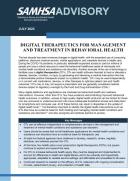
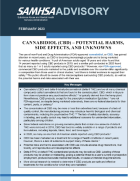
This advisory introduces readers to Cannabidiol (CBD), how it is derived, how it differs from THC and other cannabinoids, the risks and harms of CBD use, and common misconceptions given its broad availability.
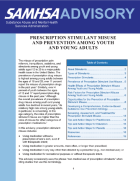
This Advisory reviews the evidence on prescription stimulant misuse among youth and young adults. It establishes prescription stimulant misuse as a public health problem, identifies associated risk and protective factors, and provides programs and action steps for stakeholders to prevent misuse.

This Advisory is an update to the SMA10-4591, Vol. 9 Issue 2, published in 2010. The advisory summarizes key elements of Traumatic Brain Injury (TBI), and describes its relevance to behavioral health, including recommendations for behavioral health professionals.
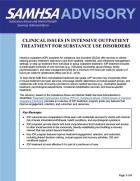
This Advisory, TIP 47, Substance Abuse: Clinical Issues in Intensive Outpatient Treatment, provides an overview of intensive outpatient (IOP) treatment. It discusses typical program goals; outlines key features that improve engagement, retention, and outcomes; and provides additional resources on this critical topic.

This Advisory, based on Treatment Improvement Protocol (TIP) 54, Managing Chronic Pain in Adults With or in Recovery From Substance Use Disorders, is for primary care providers who treat or are likely to treat adult patients with or in recovery from substance use disorders (SUDs) who present with chronic pain. It addresses screening and assessment tools, nonpharmacologic and nonopioid treatment for chronic pain, and the role of opioid therapy in people with chronic noncancer pain and SUDs.

This Advisory is based on Technical Assistance Publication (TAP) 21-A, Competencies for Substance Abuse Treatment Clinical Supervisors. It identifies foundational knowledge and concepts essential for supervisory proficiency, roles and skills expected of clinical supervisors, the purpose and context of competencies for supervision in substance use disorder (SUD) treatment programs, and dissemination and implementation of these competencies.

Based on Treatment Improvement Protocol (TIP) 41, Substance Abuse Treatment: Group Therapy, this Advisory provides an overview of goals, processes, group-specific approaches, resources, and common elements that support favorable outcomes in group therapy.
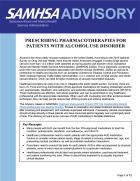
This Advisory, based on TIP 49, Incorporating Alcohol Pharmacotherapies Into Medical Practice, focuses on medication and related treatment decisions made after screening and assessment for AUD, and medically supervised withdrawal, if necessary. Alcohol consumption should not stop abruptly in those patients who have consumed alcohol regularly over a prolonged period of time. This Advisory is meant as an overview of AUD medications to facilitate abstinence.

This Advisory, based on TIP 38, Integrating Substance Abuse Treatment and Vocational Services, presents strategies and resources for SUD treatment counselors and clinic directors to improve outcomes for clients in recovery by helping them find and keep employment and deal with workplace stresses. This Advisory is directed to programs serving clients who are unemployed, underemployed, or struggling in workplace settings.
Displaying 1 - 10 out of 18

